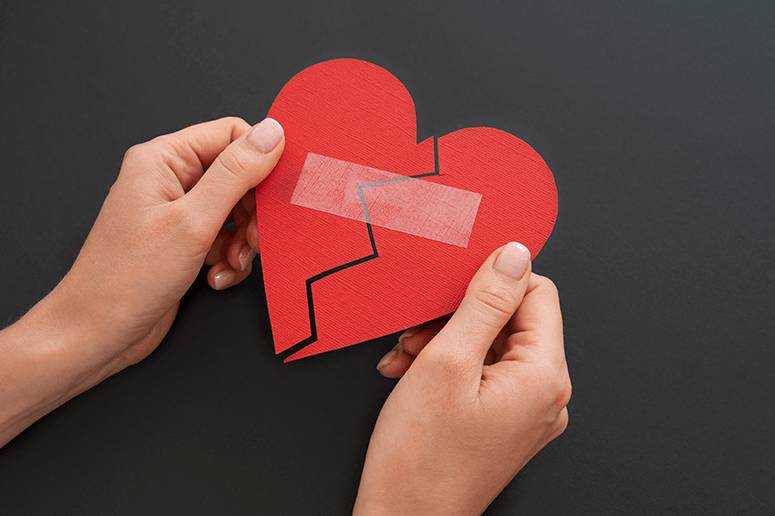Healing a broken heart: How to pick up the pieces
If you have ever had the fortune of being completely and totally in love with a partner who reciprocated it with the same intensity, count yourself as extremely lucky.
There is nothing like it. Life looks so different from the rose-coloured lens of love. We feel energized, strong and optimistic, but mostly, just happy this person is part of our world.
Sadly, relationships can end for many reasons: old hurts that were never addressed, physical distance, betrayals, or unrealistic expectations. Regardless of the cause, the pain and suffering it brings can be devastating for many.
“A broken heart is probably one of the most painful experiences this life has to offer,” says happiness specialist Rebbeca L Norrington. “It’s not only losing the person you were with but also the life you thought you might have had together, that hurts the most.”
In scientific terms, to be heartbroken is to be so sad that it feels like your heart has physically cracked inside your chest and many of us can relate to this concept at some point in our life. That deep sorrow when a cherished relationship ends, the bottomless sense of loss, the physical pain, sadness and longing can make you sick to your stomach.

Anyone who has been through a bad split can attest that breakups take a powerful toll on health. One recent study in the journal Psychology showed that 64 percent of participants experienced serious physical effects, such as stomach pains, loss of appetite, depression, nausea, insomnia and distressing thoughts.
It’s important to clarify that heartbreaks are not only linked to romantic relationships but include the passing of a loved one, the loss of a long-standing friendship, or even the death of a pet.
But in the spirit of Valentine’s Day, let’s concentrate on the love connection. Or in this case, the end of that connection, how it affects us—and how to heal.
So once the breakup is evident, what to do with the turmoil, disappointment, leftover love, and emotions that remain bubbling inside us? And most importantly, how long will the process.
Research confirms that ending a love relationship is considered one of the most difficult instances in a person’s lifetime. Whether it’s a breakup from a boyfriend, girlfriend, spouse, life partner or best friend, it takes time for wounds to heal.
Regardless of who initiated the split, you will probably go through five stages of grief. It’s important to note that these phases don’t necessarily go in order, and you may skip, omit or backtrack, but they give you an idea of the different emotions one will encounter.

Denial. Denial gives your heart time to adjust to the new situation. In this phase, you may think that your significant other is coming back to you and things will go back to normal. Not believing the relationship is over still lingers. Clinical psychologist Dr Kristina Hallett explains that as people move into denial, "they’re looking for information—they tend to hyper-focus on things like, ‘She or he said they’d love me forever,’ or ‘They promised we were going on a trip together.’” Everybody spends different amounts of time in this phase.
Anger. It is normal to be angry at your former partner. You may resent her/him for causing you pain or for causing the breakup. Are you angry because your partner cheated? Angry because the breakup was out of the blue? Angry with yourself—or them—for not investing more in the relationship? Ultimately, though, anger is often an emotion that surfaces before we can face deeper emotions,
In this phase, it is important not to make rash decisions that you may regret later. Allow yourself to work through your anger by talking to close friends or a counselor, exercising or journaling your emotions.
Bargaining. In the bargaining phase you will try to restore your relationship or perhaps try to rebuild it as a friendship. Questions such as “What can we do differently?” or “Can we just give it another chance and try again?” Also, attempting to befriend an ex soon after the breakup will only keep the pain of heartbreak fresh. This is not the time. Until things have cooled down, some time has passed, and you both have a chance to get some clarity and closure, it’s best to avoid reaching out during this phase.

Depression. It’s normal to be sad. At this point in your grieving, you come to terms with the fact that the situation is not going to change, and this is a time for reflection. You may want to be left alone but it’s advisable to rely on the support system around you to keep you distracted from your grief. Don’t be ashamed to cry. Crying helps lessen the severity of the pain you are feeling. Resist the temptation to indulge in alcohol, drugs or food to compensate. It’s time for self-care so try to eat properly, sleep enough and be physically active.
Acceptance. It’s natural to harbor a place in your heart for loved ones. Special relationships make us who we are. However, in the final stage of grief after a breakup, you will begin to piece together what happened, accept the breakup, and acknowledge the part you played in it. Learn from the mistakes made and avoid carrying them into the future. This is the healthiest way to fully accept a breakup and grow as an individual. Be kind to yourself and keep in mind that time will heal most wounds.
The feedback is not conclusive in terms of how long it will take to get over a heartbreak. Some experimental polls report from three to six months, while others calculate a year or even two. Generally speaking, the greater the personal investment in a relationship in terms of time and emotions, the longer the time to recover.
First loves will always hold a special place in your heart, and we can thank our brains for that. According to Dr Robin Buckley, a cognitive behavioural coach, love is addicting. “Your first love is a challenge to forget because it leaves an imprint on the sensory areas of your brain,” he says, and it may become the “behavioral template for future relationships.”
But contrary to popular belief, it is possible to eliminate all heartbreak and disappointment. The secret is to prioritize happiness through self-care, introspection and proper closure
These are some tools to help you in the process:
Take time to grieve. Accepting the loss of your relationship and the painful feelings that come with it is an important step towards recovering. Suppressing your feelings won’t help you work through them. Only by acknowledging that distress can you begin to let go. Sitting with your sadness, anger and disappointment might hurt at first but practices such as mindfulness, meditation and similar approaches can help you get more comfortable recognising and accepting emotions.

Journal your thoughts. This practice can be cathartic. Keep a journal nearby to write your thoughts and unload your emotions freely. Writing regularly is a useful tool to help you process the pain. It’s time to re-evaluate your needs. It can be heavy introspective work but once you do you might be able to clarify the qualities to look for in a future partner.
Keep your distance. Establishing physical and emotional distance from your partner can create space to process events. It might be difficult to completely avoid the other person, especially if you share similar social circles or interests. However, establishing boundaries around contact can help create a helpful distance. Try to remove yourself from social media and refrain from checking updates on your ex, as you won’t be able to move on if you are constantly being visually drawn into their lives.
Seek human touch. When a loving partnership ends, being held and touched will help you heal. Gift yourself with a massage, a Reiki session or any therapy that involves another human caring for you. Amongst other benefits, touch is known to reduce anxiety levels, help us relieve mental stress, and enhance feelings of wellness that ignite healing.
Don’t jump prematurely into another relationship. You might feel a sense of urgency about finding a new romantic partner, but those so-called “rebound relationships” prevent you from working through the previous one and you might end up repeating patterns or just covering up the pain rather than fully healing, which might lead to another breakup.
Turn your attention towards others. When the pain of a break feels too hard to bear, you may find that focusing on the needs of others can help bring feelings of well-being and distract you from focusing solely on yourself. Consider volunteering at a soup kitchen, joining a charitable organization, visiting a friend in need or an elderly family member you are close to.
Appreciate the good memories. Even if this relationship ended, chances are there are some really good memories left behind. Those instances might bring nostalgia, but they also will allow you to embrace the chance you had to live them.
Seek closure. It is important to be able to express yourself properly at the end of a relationship with as much clarity as possible. When spoken, words can often be muddled by intense emotions, so try to write them instead. Compose a letter that will explain to yourself why this relationship ended. You can choose to send it or not. This exercise will help you process why it failed to work, and identify the weak links, mistakes, and expectations.
Forgive. Forgiving your ex takes time and may not come easy especially if you were hurt or betrayed. But forgiveness is a vital part of the healing process. Failure to do so can get in the way of your next relationship. Psychology professor Kathy Belicki says the best formula for forgiving an ex is doing it from a place of empathy. Imagining why that person may have been the way they were. Belicki argues that forgiveness in this way leads to more serenity.
Talk to a professional. If you feel as though you are not recovering as you should or just can’t endure the pain, seriously consider counseling. Psychologists are trained to help you channel these emotions properly and talking about it with a trained therapist will teach you new tools to help you heal.
* * *
People come into our lives for different reasons, and we are eventually shaped and modeled by what we have lived and learned from them and the moments of happiness together.
Ultimately what we are left with at the end of our life journey are the good memories and the love shared with partners who crossed our paths at one time or another. Even if the hope of “forever” did not happen.


